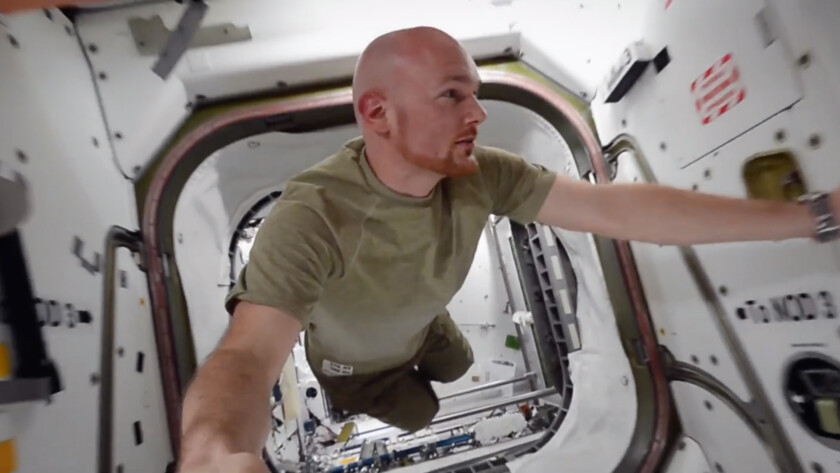Bryn Chiappe reviews this unique cinematic look into the international crises of climate change.
Marc Bauder’s Who We Were sits somewhere in the grey area that separates documentaries from video essays. The film is drawn from an unpublished book that Roger Willemsen, a German writer, thinker, and TV host was working on before his death in 2016. It maps current the state of affairs in the climate crisis and the factors that have contributed to humanity’s relatively stagnant and ineffectual response to the disaster taking place around us. The impressive thing about the project is its ability to take in a worldwide and scientific scope whilst keeping itself very much rooted in human experience. We’re guided through the various sections by experts speaking objectively and from the heart in a double-pronged attack that brings the inhumanity of humanity’s willful ignorance to the surface in a troubling and stirring fashion. The speakers range from an astronaut to a deep-sea researcher to a Buddhist monk, and each section feels like it is moving the argument forward in some way, even if the overall message of the film remains the same throughout.
The title remains on ones mind for the duration of the film as a niggling sense of dread – the use of the past tense in describing humanity creates a disturbing encouragement to position oneself as viewing the content through a retrospective lens. This heightens the power of the subject matter when it’s concerned with the patterns of thought that led us to where we are, and it pulls the rug out from under the viewer when they become too comfortable with criticising the decisions of those in the past. We’re forced to consider the fact that very little has changed since the environment became a major talking point, and that on the current course of inaction we are pushing humanity towards existing only in the past tense. There isn’t much in the way of ground-breaking revelations or investigative journalism, but by taking in the crisis from such varying angles, Bauder is able to create a lucid image of how we have ended up in a crisis of unparalleled ecological scale.
The film begins relatively slowly. There are some absolutely breathtaking shots of the natural world and the planet from space, but not much in the way of substantial content. That being said, the footage of the Amazon rainforest from space is truly harrowing and made all the more impactful by the fact that the camera is in a pod with an astronaut who delivers an impassioned rant about how the sight makes him feel, rather than just a sterile list of statistics. As powerful as this is, it takes a frustrating amount of time for the film to get past the point of stating what the problem is and onto the question of how and why it is occurring. Once this transition has been made, it does throw up some insightful points, and many that aren’t usually included in the reductive generalisations that make up discourse around climate change. There’s a satisfying amount of attention given to the western blind eye to the consequences of a rampantly unrestricted free-market system on other parts of the world. Africa outputs just 4% of the world’s greenhouse gas emissions yet takes the brunt of the catastrophic impact on the climate. There’s a great section discussing this in which someone questions whether Anthropocene is as apt of a term as Capitalocene or Occidentecene.

Leading on from this into an interrogation of the genealogy of Western values is by far the film’s most original and interesting point. Someone raises the point that Western paintings have historically tended towards placing humans in the foreground with pastoral landscape forced into the periphery. The Buddhist monk who is interviewed asserts that freedom should not equate to freedom of the individual to seize and control on impulse, which he describes as being “a slave to your thoughts”, and states that this has been a fundamental misunderstanding of Western thought that has shaped our understanding of individualism for the worse. He explores the cognitive dissonance required to live in a hyper-capitalist society through what he identifies as ‘obituary values’. Western society operates on a value system for living individuals that is centred around their capability to generate wealth, but at someone’s funeral nobody speaks fondly of their skill at hostile takeovers and profitable mergers; they speak of their interpersonal relations, empathy, and selfless deeds. We can see here that there is a fundamental disjuncture between the values practised and those that are in place in a retrospective, theoretical sense.
I spent much of the film with a growing sense of irritation at the fact that it was diagnosing symptoms that are already common knowledge without providing much in the way of remedies. At points, I came to question whether this irritation was misdirected at the filmmakers for the fact that one could argue the solutions are glaringly obvious and it is the unresponsive attitude of world leaders that is preventing the change required. I quickly abandoned this line of thought upon considering the fact that proposed solutions must be ones that deal with political stagnation around climate action, not just the climate action itself. It was a failing on the film’s part to not devote any focus to the idea of The Green New Deal. This Keynesian project seems to be the brightest source of hope for future policy, keeping itself rooted in job creation whilst enacting the necessary infrastructure changes to swing the balance back into something of a safe space for the continuation of human life. Working within a realistic economic framework for proposing change is far more powerful for swaying the opinion of those who hold power and are resistant to attacking the status quo as a result. As said in the film, “it’s impossible to solve the problem of a lack of co-operation through conflict”.

Although the film avoids spouting the absurd Extinction Rebellion assertion that climate campaigning shouldn’t be a political endeavour, it nonetheless fails to approach the issue from a sufficiently proactive standpoint with regards to the change required in the future. The film tends towards a general aversion to proposed solutions. It points the finger at big business as it if will change anything and encourages the public to consume more wisely as if this isn’t a classist, unrealistic approach to pursuing real change. These arguments definitively make the project as a whole feel like it is preaching to the choir without much to offer besides reinforcing existing opinions. For all the value that the insightful moments of the film have, they never manage to pass into the threshold of feeling like they will have an impact outside of the two-hour runtime.




